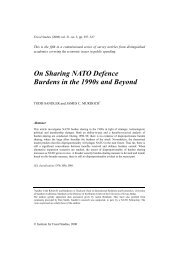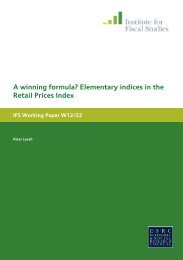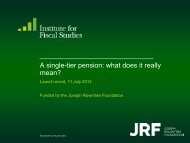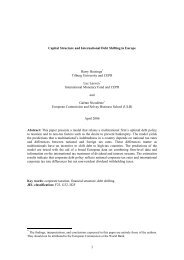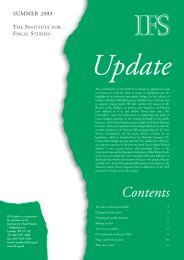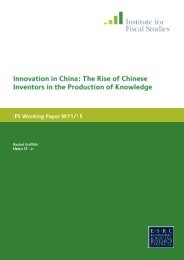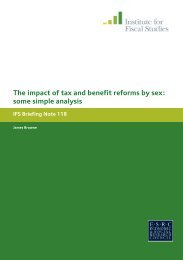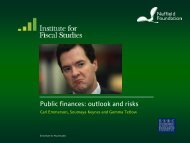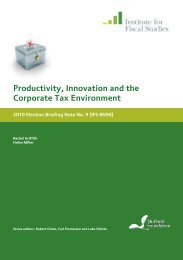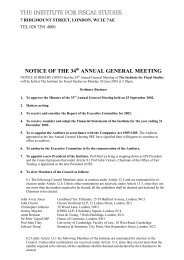Download full version (PDF 431 KB) - The Institute For Fiscal Studies
Download full version (PDF 431 KB) - The Institute For Fiscal Studies
Download full version (PDF 431 KB) - The Institute For Fiscal Studies
- No tags were found...
Create successful ePaper yourself
Turn your PDF publications into a flip-book with our unique Google optimized e-Paper software.
Press ReleaseUniversal Credit: much to welcome, butimpact on incentives mixed<strong>The</strong> Universal Credit will dramatically change the welfare system for workingageadults. If successful, it will make the welfare system more effective andcoherent. But it will create winners and losers in the process: couples withchildren will gain from it and, when transitional protection expires, loneparents will lose. This is one of the key findings of a preliminary analysisfunded by the ESRC and published today by the IFS.<strong>The</strong> Universal Credit will have mixed impacts on work incentives with, onaverage, stronger incentives to work for single adults and main earners incouples, but weaker incentives for both adults in a couple to work, rather thanjust one. It will also lead, on average, to stronger incentives for low earners toearn more, but slightly weaker incentives for middle earners to earn more.Mike Brewer, Deputy Director of the <strong>Institute</strong> for <strong>Fiscal</strong> <strong>Studies</strong> and an authorof the report, said: “<strong>The</strong> Universal Credit has the potential to simplify thecurrent complicated overlap between benefits and tax credits, making lifeeasier for claimants and saving money currently wasted on administrationand lost to fraud and error. But our analysis illustrates the constraints allgovernments face when contemplating radical welfare reform. Workincentives will be strengthened for some, but weakened for others, and thereform will lead to both winners and losers in the long-run. One clear group oflosers will be families with children having savings of over £16,000: they cancurrently receive tax credits but will not be eligible for any Universal Credit.This may well focus spending on those who need it most, but also givesfamilies an extremely strong incentive to keep financial assets below thislevel.”Tel: +44 (0) 20 7291 4800Fax: +44 (0) 20 7323 4780mailbox@ifs.org.ukwww.ifs.org.uk7 Ridgmount StreetLondon WC1E 7AEEmbargoUntil 10:00, Wednesday12 January 2011ContactsBonnie Brimstone,<strong>Institute</strong> for <strong>Fiscal</strong> <strong>Studies</strong>020 7291 4800What is the Universal Credit and how will it work?<strong>The</strong> Government plans to replace most means-tested benefits and tax creditsfor working-age adults with a single benefit, known as Universal Credit. Thiswould be the largest reform to the welfare system since at least the 1988Fowler reforms, and should simplify the welfare system and, on average,strengthen incentives to work. Full details are due in the Welfare Reform Billlater this month, and this preliminary analysis is based on the limited amountof information given by the Government in its November 2010 White Paper,"Universal Credit: welfare that works".Basic entitlements to Universal Credit will be set so most families receivingout-of-work means-tested benefits will receive the same payments as theywould under the current regime. Earnings (measured after tax, and havingdeducted a disregard) will reduce Universal Credit awards at a rate of 65%.This is a much lower rate than under the current set of out-of-work meanstestedbenefits, and will therefore strengthen the incentive to earn smallamounts. It also means that Universal Credit will extend further up theearnings distribution than existing benefits, meaning that the working taxcredit will no longer be needed to help ensure a positive financial gain towork. However, the withdrawal rate applying to earned income will be higherthan currently applies under tax credits for those in work.Director:Paul JohnsonResearch Director:Richard Blundell<strong>The</strong> <strong>Institute</strong> for <strong>Fiscal</strong> <strong>Studies</strong>Limited by Guarantee,Registered in England: 9546167 Ridgmount StreetLondonWC1E 7AERegistered Charity: 258815VAT no: GB 394 5830 17
Unearned income will reduce Universal Credit payments pound-for-pound, arate which is identical to that in the current set of means-tested benefits, buthigher than currently applies under tax credits. Capital rules in UniversalCredit mean that families with more than £16,000 of financial capital will notbe entitled to any Universal Credit at all. This is no change from the currentmeans-tested benefits, but a dramatic change from tax credits, where asimilar amount of savings would merely reduce tax credits awards by, atmost, £1.42 a week.Who will win and lose and how much will it cost?<strong>The</strong> report analyses the likely winners and losers from Universal Credit, andits impact on work incentives. Using assumptions very similar to thoseunderpinning the Government’s analysis in its White Paper – which assumed<strong>full</strong> take-up of benefits, and ignored any behavioural impact of UniversalCredit – the analysis suggests that:the long-run cost of Universal Credit will be around £1.7 billion (in 2014–15 prices);2.5 million families will gain, and, in the long-run, 1.4 million families willlose and 2.5 million families will see no change in benefit and tax creditentitlement;Universal Credit will benefit poorer families more than richer ones, onaverage. <strong>The</strong> bottom six-tenths of the income distribution will gain onaverage, while the richest four-tenths will lose out slightly in the longrun;On average, couples with children will gain more than couples withoutchildren, who will in turn gain more than single adults without children.Lone parents will, on average, lose in the long-run. But there will bewinners and, in the long-run, losers amongst all family types.If, as should happen, Universal Credit increases take-up, then the number offamilies gaining and the cost to Government might be higher. And if UniversalCredit encourages more people to work, this might reduce the cost toGovernment. <strong>The</strong> Government intends that no current recipient of benefits ortax credits will lose out at the point of transition to Universal Credit, and thistransitional protection will increase the cost to Government, and reduce thenumber of families losing, in the short-run. (<strong>The</strong> report also presents resultswith this transitional protection.)How will it affect work incentives?<strong>The</strong> report also examines how Universal Credit will change financial workincentives.One measure of the extent to which taxes and benefits weaken the incentiveto work at all is the participation tax rate (the fraction of earnings lost toincome tax, national insurance and withdrawn benefits or tax credits whensomeone moves into work). <strong>The</strong> report finds that Universal Credit will reducethe number of individuals who face a participation tax rate of 70% or more by1.1 million, but will increase the number of individuals who face aparticipation tax rate of 60% or more by 350,000.<strong>The</strong> Universal Credit will strengthen the incentive to work at all, on average,particularly for those who have the weakest incentives to work under thecurrent tax and benefit system, namely very low-earning single people andprimary earners in couples. However, Universal Credit will weaken incentivesto work for (potential) second earners in couples, who see Universal Credit<strong>The</strong> <strong>Institute</strong> for <strong>Fiscal</strong> <strong>Studies</strong>Limited by Guarantee,Registered in England: 9546167 Ridgmount StreetLondonWC1E 7AE
withdrawn more quickly if they entered work than currently happens withtax credits.A measure of the extent to which taxes and benefits weaken the incentive forthose already working to earn more is the marginal effective tax rate (thefraction of a small rise in earnings lost to income tax, national insurance andwithdrawn benefits or tax credits), and the report finds that the UniversalCredit will:reduce the METR of 1.7 million workers, and increase the METR of 1.8million;lower, on average, METRs for those on low earnings, and raise themslightly for those on middle earnings.reduce the highest METRs – for example for those currently on an out-ofworkmeans-tested benefit– but increase METRs for basic-rate-tax-payingworkers currently facing a tax credit withdrawal, and for low earnerswith a working partner.ENDSNotes to Editors:1. <strong>For</strong> embargoed copies of the report, “Universal Credit: a preliminary analysis” byMike Brewer, James Browne and Wenchao Jin, or for other queries, contactBonnie Brimstone at IFS: 020 7291 4800, bonnie_b@ifs.org.uk.2. IFS will hold a briefing from 10am – 11:15am on Wednesday 12 January 2011(http://www.ifs.org.uk/events/643). Please let Bonnie Brimstone know if youwish to attend: 020 7291 4818 / bonnie_b@ifs.org.uk .3. This research was funded by the ESRC Centre for the Microeconomic Analysis ofPublic Policy at the IFS.4. <strong>The</strong> Government’s November 2010 White Paper, "Universal Credit: welfare thatworks" is at http://www.dwp.gov.uk/docs/universal-credit-<strong>full</strong>-document.pdf.<strong>The</strong> benefits due to be replaced by Universal Credit are income support, incomerelatedjobseekers allowance and employment and support allowance, workingtax credit, child tax credit and housing benefit.<strong>The</strong> <strong>Institute</strong> for <strong>Fiscal</strong> <strong>Studies</strong>Limited by Guarantee,Registered in England: 9546167 Ridgmount StreetLondonWC1E 7AE



